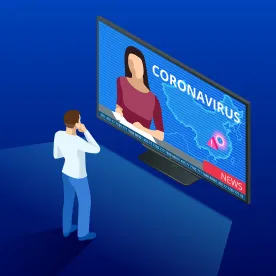Over the course of the past few weeks, we have all asked and attempted to answer many questions about workplace law and the COVID-19 response, including questions arising under the new Coronavirus Aid, Relief, and Economic Security (CARES) Act. In the labor space, one question that continues to come up goes something like this: “We have heard that taking advantage of programs under the CARES Act may require an employer to remain neutral during any union organizing effort. Is that true and, if yes, what does it mean?”
We want to put this question to bed, at least for today, and give you some comfort about how to move forward. The short answer, while it is true that one of the loan programs authorized by the CARES Act for use by mid-sized employers will carry with it a neutrality requirement, as of today that specific program has not been created. More importantly, there appears to be at least one alternative loan program available to the same mid-sized employers that does not obligate neutrality.
In simple terms, the CARES Act creates a large pool of funds to be used by the U.S. Department of Treasury and the Federal Reserve to provide loans to keep the market liquid. While some of these loans will be used for targeted industries like airlines, the bulk will be used to support small and mid-sized businesses. The provisions available to provide “Assistance for mid-sized businesses” in section 4003(c)(3)(D) appears to contemplate the creation of two lending programs. The first one, described in Section 4003(c)(3)(D)(i), authorizes the Secretary of the Treasury to create a program to provide financial assistance to make direct loans to mid-sized employers defined as having between 500 and 10,000 employees.
The section defines the terms for those loans (e.g., an annual interest rate that is not higher than 2 percent with no principle or interest payment for the first 6 months) and importantly states that any borrower applying for a loan under this program must make 10 good-faith certifications that they will take certain actions concerning this loan. It is certification number 10 that contains the neutrality obligation, obligating the recipient of the loan to certify that it “will remain neutral in any union organizing effort for the term of the loan.”
So it is true that the terms of at least one of the loans authorized by the CARES Act involves a neutrality commitment. But, here is the important part: the language in the legislation only states that the secretary “shall endeavor to seek” the creation of such a program and if he or she does, that such program will contain each of the outlined requirements including the neutrality requirement. As of today, however, no such program has been implemented and thus there are no CARES Act loans available that would impose a neutrality requirement.
Clearly, the concept of neutrality, which is not defined by the legislation and presumably would be clarified in any implementing provisions, involves very serious labor relations considerations and could result in the limitation of employer free-speech rights that otherwise exist under Section 8(c) of the National Labor Relations Act. But for today, this is not an immediate concern. We are closely monitoring this issue and will report immediately if and when such a loan program is implemented.
More importantly, there are other avenues for mid-sized employers to obtain relief loans under the CARES Act. As indicated above, Section 4003(c)(3)(D)(ii) authorizes the creation of a second program by the Federal Reserve to provide loans to these mid-sized businesses. This program, referred to as the “Main Street Lending Program”—was a concept that the Federal Reserve was already working on when the CARES Act became law. On April 9, 2020, the Federal Reserve announced the details for loans under this program, making clear that they were available to employers of any size, including those with up to 10,000 employees and potentially to employers with more than 10,000 employees so long as its 2019 annual revenues did not exceed $2.5 billion. Loans under the Main Street Lending Program do not require any recipient employers to remain neutral in any union organizing effort. The Federal Reserve could issue additional clarifications regarding the terms for these loan programs. If any implicate the neutrality issue, which we still think is unlikely, we will provide an update.
As organizations evaluate this issue, they may find it helpful to have the names of other major CARES Act lending programs that do not involve the concept of neutrality:
-
Main Street Lending Program:
-
Main Street New Loan Facility;
-
Main Street Expanded Loan Facility;
-
-
Paycheck Protection Program (PPP) and Pay Check Protection Program Lending Facility;
-
Primary Market Corporate Credit Facility (PMCCF);
-
Secondary Market Corporate Credit Facility;
-
Term Asset-Backed Securities Loan Facility (TALF); and
-
Municipal Liquidity Facility.
Finally, the neutrality concept has no connection to the $600 per week of enhanced state unemployment compensation funded by the CARES Act, which is available to certain employees until the end of July. To the extent that an organization has employees who receive enhanced unemployment payments under this provision, that fact does not implicate any neutrality obligation.
So, as of today, the neutrality obligation created by one provision under the expansive CARES Act appears to have limited impact and in actuality has no impact at least until the Secretary of Treasury creates this program. If that happens and an organization takes funds under that specific program, neutrality (and other obligations) become relevant and will require quick and aggressive management. The bigger concern may be the optics of having organizing neutrality as part of a piece of federal legislation that has now been signed into law. Unions have spent many years trying to pass legislation containing concepts like card check, first contract interest arbitration, and the elimination of right to work and having their first success, albeit limited, will motivate the labor movement in the future should the political environment in D.C. become more favorable.




 />i
/>i

